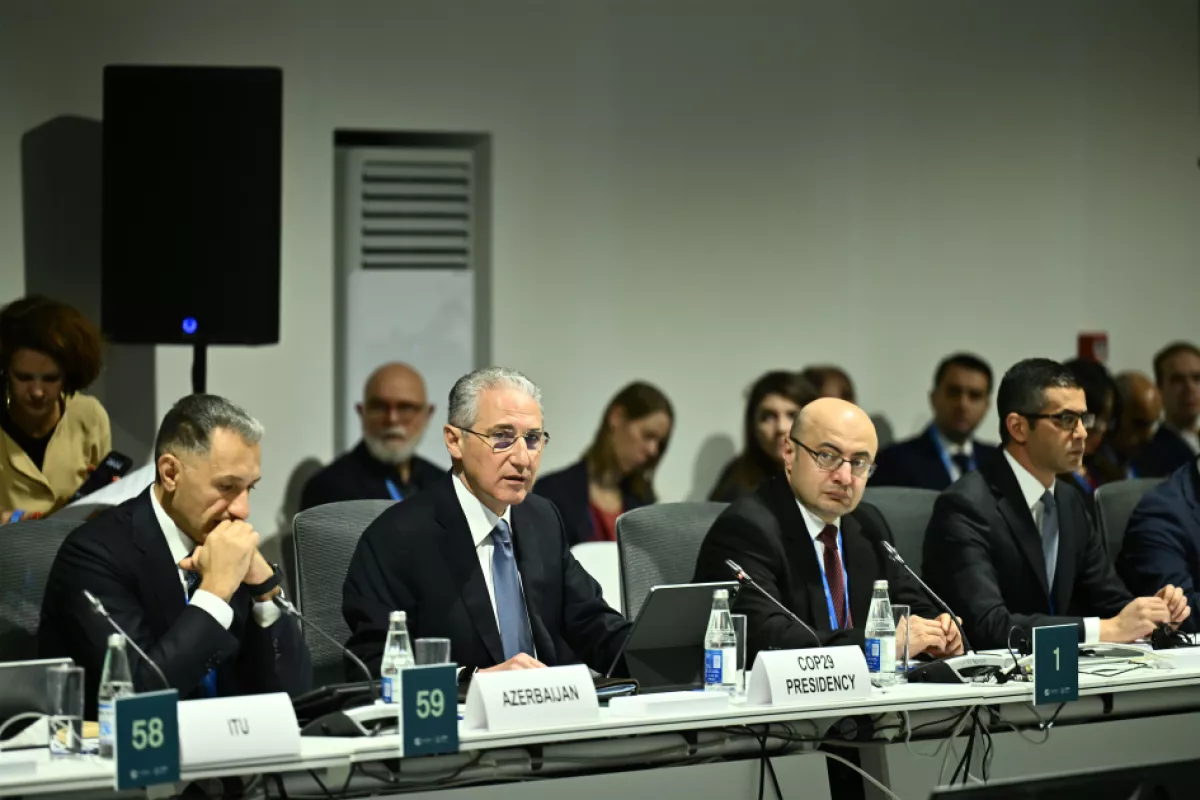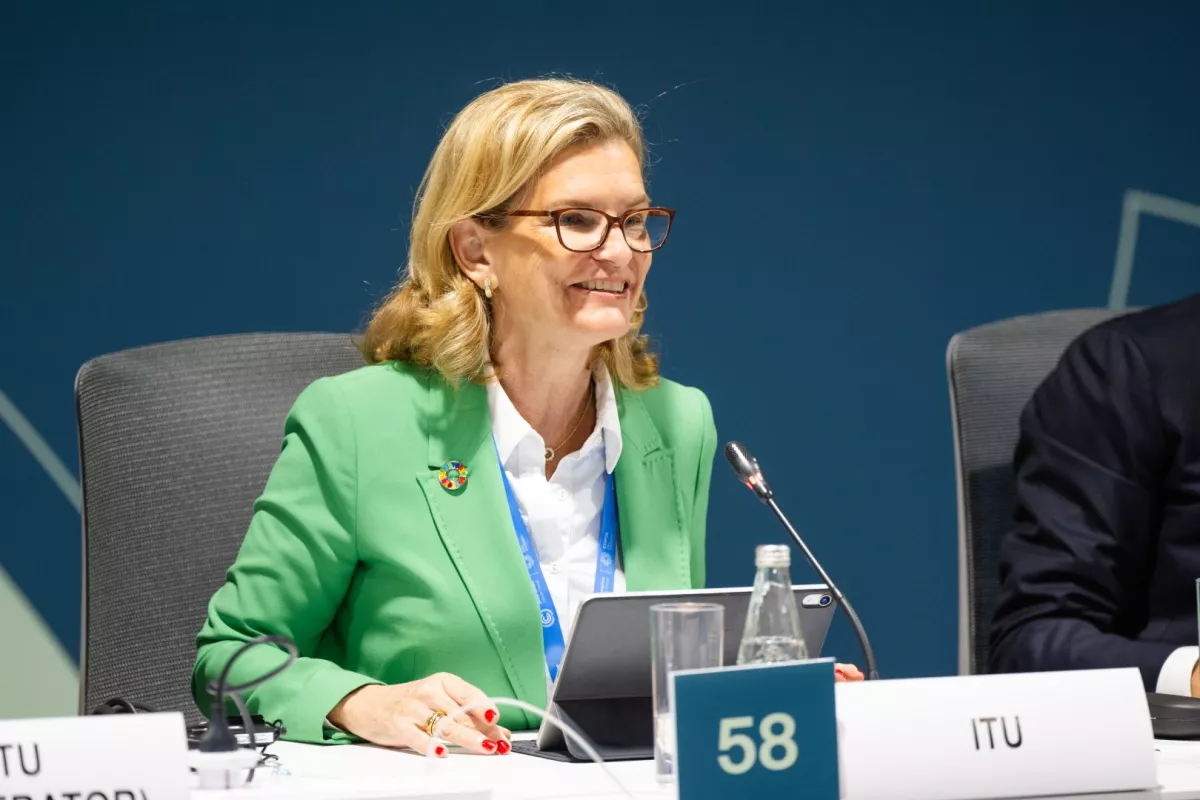COP29: Riding the digital wave in a “green” era Reducing carbon footprint
The main trends shaping the global economy in the foreseeable future are rooted in the goals of the Fourth Industrial Revolution (4IR). These initiatives call for the digitalization of all processes across agriculture, finance, business, public administration, and the development of advanced network infrastructure, among others. However, these tasks must now be carried out within the framework of the Green IT concept, aimed at integrating environmentally friendly approaches into the ICT sector and minimizing the digital industry’s impact on ecological balance.
The role of Green IT in achieving the United Nations’ climate agenda was a key topic of discussion at a high-level roundtable on "green" digital initiatives held in Baku on November 16, as part of the COP29 conference.
The concept of an environmentally friendly IT sector dates back to 1992, when the US Environmental Protection Agency (EPA) launched the Energy Star program. This initiative encouraged manufacturers of digital equipment to voluntarily label and identify products with high energy efficiency—devices that consume less energy while maintaining high performance. For consumers, these products offered the dual benefit of saving money on energy costs and indirectly contributing to the reduction of greenhouse gas emissions.
In the years that followed, these principles were significantly expanded to encompass a range of additional areas and practices. Within the framework of the Green IT concept, companies in the ICT sector began voluntarily committing to monitoring and reducing their CO2 emissions, as well as ensuring the safe disposal of toxic waste from electronic equipment production. This included establishing safe systems for collecting and recycling used lithium batteries and other environmentally harmful components.
"Green" principles also called for reducing the use of hazardous materials, promoting the biodegradability of unused and obsolete products, and increasing the recycling of waste materials.
In recent years, most global IT manufacturing giants have adopted Environmental, Social, and Governance (ESG) reporting principles to ensure transparency in their operations and eco-friendly IT practices. Moreover, ESG criteria have become a standard for many public and private organizations in developed countries when upgrading computer equipment and implementing industrial ICT technologies.
Other components of the Green IT concept include redesigning data processing centres (DPCs) and DATA centres to reduce energy consumption. This involves optimizing cooling systems for servers and computer systems, as well as integrating renewable energy sources (RES) to power these facilities.
To enhance energy efficiency, companies are increasingly adopting virtualization of workflows and leveraging cloud computing capabilities, enabling more efficient utilization of computational resources.
Another key principle of the ESG framework focuses on training ICT staff in the environmentally responsible use of digital resources and promoting Green IT principles at the corporate level.
In late 2023, the United Nations, in collaboration with consultants, released the UN Sustainable Development Goals (SDGs) Digital Acceleration Agenda. This report provides a global analysis of the relationship between countries' levels of digitalization and their progress on sustainable development and climate goals. It highlights that digital technologies can play a pivotal role in achieving approximately 70% of the SDG targets, significantly accelerating efforts to meet these goals by 2030. Notably, two-thirds of developing nations are now incorporating digitalization initiatives into their national strategies to combat climate change and reduce greenhouse gas emissions.
During the ongoing UN Climate Conference — COP29 — the achievements and prospects of implementing the Green IT concept were also discussed. On November 16, a high-level roundtable on "green" digital actions took place in Baku.
"Digital technologies play a key role in our fight against climate change. They offer powerful tools for climate monitoring, early warning systems, improving energy efficiency, and promoting circular economy principles," said Mukhtar Babayev, President of COP29 and Azerbaijan’s Minister of Ecology and Natural Resources, during his speech at the roundtable.
"At the same time, as digital tools proliferate, we must also recognize their environmental costs. These include increased energy consumption, emissions, and the growing problem of e-waste.," he noted. The minister highlighted that, according to the World Bank, the ICT sector is currently responsible for approximately 4% of global emissions, stressing that all nations must act to minimize this impact.

"Azerbaijan takes pride in its contribution to the multilateral initiative for 'green' digital actions alongside our partners. Our transformation is driven by the e-government platform, which enhances the efficiency of public services, making them more accessible and environmentally friendly," said Rashad Nabiyev, Azerbaijan's Minister of Digital Development and Transport, during the roundtable.
"The transition to a fully digital government has already begun, with several key, essential processes now entirely digitized. As part of this shift, we have implemented a modern system for exchanging digital documents between government institutions, significantly reducing the use of paper," he added.
The Minister of Digital Development and Transport reminded that, according to global studies, the share of emissions from the ICT sector could reach 8% of the global total by 2030. "Data centres alone consume about 1% of the world's electricity. In response to these challenges, many countries are optimizing the operation of such facilities, reducing energy consumption by up to 40% through the use of innovative cooling and energy management technologies," said Rashad Nabiyev.
He also emphasized that to promote the principles of Green IT, it is crucial to implement eco-friendly technologies and develop artificial intelligence (AI) capabilities, which have significant potential to reduce global emissions from the IT sector to below 4%.
In turn, according to Doreen Bogdan-Martin, the Secretary-General of the International Telecommunication Union (ITU), full support for the "green" digital action declaration is essential.

"Combating climate change lies at the heart of the UN Pact for the Future and its Global Digital Agreement. Our member states have realized that digital transformation and sustainability must go hand in hand. That is why they made the decision to make sustainable digital transformation one of the two strategic objectives of the International Telecommunication Union (ITU)," she said.
The Secretary-General noted that global IT companies are among the largest purchasers of renewable energy, with some already relying entirely on electricity from renewable energy sources (RES). However, according to the ITU report Greening Digital Companies, the carbon footprint of the tech sector continues to grow due to the rising global demand for equipment, network services, and data storage.
Therefore, Doreen Bogdan-Martin believes that the digital sector can and must do more to "enhance its environmental friendliness": "That is why we are here today to support the Green Digital Action Declaration at COP29."
The World Bank (WB) is ready to support all countries in implementing the UN-backed "green" digital declaration, noted Sangbu Kim, Vice President of the World Bank for Digital Transformation, during the roundtable:
"Just last year, we tripled our investments in green digital technologies to $700 million, and we are committed to expanding this support in the future. We aim to assist all the countries represented here at COP29, as well as those who will join the 'green' digital declaration initiatives in the future," he said.
Azerbaijan is also joining the efforts outlined in the ITU declaration on "green" digital action, which has been fully supported by the COP29 presidency. According to Minister of Ecology Mukhtar Babayev, the declaration defines our collective commitment to using digital technologies for climate action, ensuring their sustainability and low carbon footprint.
"The COP platform will provide an excellent opportunity to discuss how digital technologies can accelerate emission reductions, climate change adaptation, and resilience enhancement. The 'green' digital action declaration emphasizes the importance of inclusivity; we must ensure that digital solutions reach the most vulnerable communities, especially those in the least developed countries," outlined Babayev, highlighting key goals.








